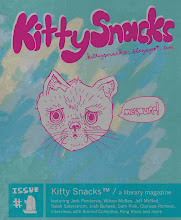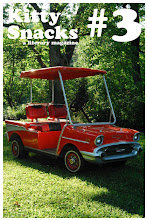by Lydia Copeland
He points to the Swan's back full of cygnets, runs a finger over the dip of neck. He is her son and has inherited all her loves. Their hands draw invisible alphabets into the pictures. She shows him how an S bends away from itself. T is a table with the guests cleared away. She thinks of rivers on maps, routes. The air outside of their house.
There was a trip West with a boyfriend once, and she watched the land slide into desert and the ice melt in the drive-thru cups. The boyfriend had spilled gasoline on his shoes, and the smell stayed with them through the red dust and saguaro, through the firewheel flowers. They watched a car on fire, rolling down the interstate. A woman on the side of the road watched with them, crying about her paintings burning in the trunk. Her summer's work. Her nose was bloody. Her hands shook. They put a blanket over her shoulders and waited for the police. She and the boyfriend slept in the car that night, and she kept waking at every sound. The boyfriend found pancakes for them every morning. He seemed to always know how to find the empty places out of the way, where the waitresses came to your table without a pen and memorized your order. There was always a George Jones song and a guy at the counter eating eggs before work.
Now she has a husband, who drives in and out of weeks and comes home for three day stretches. On these days the house is warm from cooking meals. Her husband sleeps on his side, face to her face. Now her son has learned the birds of their neighborhood. The seagull, the pigeon, the cormorants in the bay. He knows the difference between starling and sparrow in parking lots. She walks with him to the neighborhood across the street to watch mallards in a stream, floating in pairs over roots and sand, letting the water take them. Her husband returns each week with a new book. Audubon or Sibley. When he leaves again, she stacks the books on the dinner table and places their wedding photos at eye level again. Her son holds the pictures sometimes, points at the lips and eyes of his father.
When they first moved to this neighborhood, she would place her son in a stroller and walk along the Bay after dinner. The water there did not roll like the ocean further out, but lapped like a minute hand inching forward. They were always alone in these evenings, and at some point she would carry her son on her hip and point to the cargo ships, the dredger shifting the silt from the water's bottom. Once they watched an egret, standing like a ghost in tide. She knew its slow flight and its neck like a loosened ribbon. Her son was quiet in her arms, his head under her chin. She thought his eyes might be closed. She thought he might not see. Fish hid in the shadows under the water. The egret didn't move when seagulls called over them, or with the horn of the tugboat. A boy and girl from the high school held hands and walked beside them and then behind the path lined with elms and down into the long grasses where no one could see them. She rocked her son in the wind and watched the sky turn gray, the birds circling the shore.
skip to main |
skip to sidebar

blog header photo by Jane Rule Burdine
blog footer by Will Bryant
nothing from this page may be reprinted without the author's consent.

blog footer by Will Bryant
nothing from this page may be reprinted without the author's consent.




